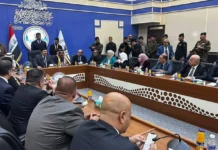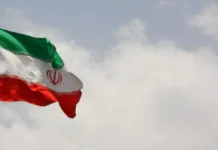Tishwash: Iraq signs contracts worth more than $1 billion with IFC
The Prime Minister’s Media Office announced today, Saturday, partnership and financing contracts with the International Finance Corporation (IFC).
A statement from the office, received by Al-Eqtisad News, stated that, “Under the patronage and attendance of Prime Minister Mohammed Shia al-Sudani, a celebration was held in the capital, Baghdad, today, to mark the 20th anniversary of the IFC’s presence and partnerships with Iraqi sectors.”
According to the statement, the ceremony witnessed the signing of several investment and development contracts with the private and public sectors, including a $500 million contract with Basra Gas Company to invest in associated gas and develop Umm Qasr Port facilities, and a $250 million contract with Al-Muhaidib Group to finance and expand cement and lubricating oil production.
In addition to a $125 million financing contract for container handling equipment and a storage yard at Umm Qasr Port with Al-Lorrain Investment Company, and a $65 million contract for the first phase of the Green Residential Real Estate Development Project in Sulaymaniyah with Hiwa Rauf Investment Company.
A $10 million credit line financing agreement was also signed with the Bank of Baghdad to finance international trade, and an investment partnership agreement was signed to establish sustainable agricultural and industrial projects with Sama Al-Manar/Teriyaki Agro, worth $120 million.
A partnership was also signed with Captain Ship Holdings to establish a $250 million teaching hospital, and a partnership was signed with Al-Ula SME Finance Company for advisory services and investment attraction development. link
Tishwash: More than 15 trillion dinars are kept in cash in the homes of citizens
The governor of the Central Bank of Iraq says 80 percent of Iraq’s money is in households and stresses that they are trying to increase citizens’ confidence in banks.
Central Bank Governor Ali Alaq said the 2025 banking reform plan is a strategic step to strengthen confidence in the Iraqi banking system and solve problems.
He said 80 percent of Iraqi money is outside the banks and in the homes, due to lack of confidence in the banks.
He added that the banking reform plan includes updating the banking system, in line with international standards and attracting global companies.
Meanwhile, Mustafa Garawi, a member of the Finance Committee of the Iraqi Parliament, warned that this phenomenon has led to a decline in market movement and economic activity.
He revealed that; According to reports, the money held in households is more than 100 trillion dinars.
Earlier, economic researcher Haider Sheikh revealed; The Central Bank of Iraq is really suffering from a shortage of cash and flows, due to the lack of confidence in the banking system and the least trust in public and private banks, which has led many citizens to keep their money in Iraqi dinars.
Revealed; More than 15 trillion Iraqi dinars are kept in cash in the homes of citizens and salaried employees, so the central bank and the Iraqi government should solve this problem and inflation, through the formulation of economic and financial policy and banking facilities for citizens and restore confidence. link
************
Tishwash: Banking reform enters a decisive phase: The Central Bank and banks are in a race against time – Urgent
To avoid penalties
The Iraqi banking sector is going through a critical phase, where economic and financial considerations intersect with the demands of structural reform that have been postponed for years.
After decades of challenges, and amid international and local pressure to improve the efficiency of the financial system, the reform paper launched by the Central Bank in coordination with an international consulting firm emerged as an attempt to rebuild trust and establish more robust rules for banking operations.
The importance of this issue goes beyond the financial dimension; it extends to the broader institutional context related to the state’s ability to formulate economic stability tools and meet transparency requirements, which in turn are linked to the confidence of investors and international donors.
In this context, economic expert Ahmed Abdul Rabbo, speaking to Baghdad Today, predicted that “the end of September will be the deadline for private banks to sign the final amendments to the reform paper submitted by the Central Bank of Iraq in coordination with Oliver and Iman.” This timing reflects the Central Bank’s awareness of the country’s need to end the period of hesitation and embark on a clearly defined reform path.
According to institutional estimates, setting a timetable for signing aims to overcome the procrastination that accompanied the first rounds of dialogue with private banks and transform reform from a theoretical idea into a practical commitment.
Adjustments in response to market pressures
Recent developments indicate that the reform was not imposed unilaterally, but rather came after a series of technical discussions with banks. Abdul Rabbo explained that “the Central Bank has made extensive amendments to the banking reform paper over the past weeks in response to the comments submitted by the banks, noting that it was keen to open an extensive dialogue with Iraqi banks to clarify the technical aspects of the reform paper.”
This clarification reveals a collaborative process that balances reform requirements with market pressures. According to economic estimates, the central bank’s understanding of banks’ comments reflects its awareness that implementing strict measures without consensus could hinder the banking system’s ability to keep pace with changes. At the same time, this dialogue seeks to establish the principle of transparency and a commitment to gradualism as a means of ensuring the effectiveness of reform, consistent with similar international experiences in restructuring banking sectors.
Gradual reform with privacy in mind
The discussion is not limited to the form of reform, but also includes its pace. Abdul Rabbo pointed out “the importance of implementing reform mechanisms gradually, taking into account the specificities of Iraq’s economic reality.” He emphasized the need to adhere to reform in principle, while formulating standards and procedures in a way that enhances confidence in the banking sector and contributes to its development.
According to economic readings, this position reflects the traditional tension between the imperative of rapid openness to international standards and the demands of a local reality characterized by fragility and instability. Gradualism, financial experts believe, reduces the shocks to small and medium-sized banks and gives the sector sufficient time to adapt to the new regulatory environment. This makes reform not only a tool for course correction, but also a means of rebuilding the contract between the state and the private financial sector on more sustainable foundations.
The essence and dimensions of the amendments
The recent amendments raise fundamental questions about the nature of the role private banks will play. Abd Rabbuh explained that the amendments “include extending the capital requirement for banks, reconsidering the ownership structure, and abolishing the foreign partner requirement, thus providing banks with greater flexibility in implementing reforms and strengthening their role in supporting the national economy.”
This change has multiple institutional dimensions. Extending the capital requirement reduces immediate financial pressure on banks, while reconsidering the ownership structure opens the door to restructuring the relationship between local shareholders and regulatory authorities.
The abolition of the foreign partner requirement reflects a shift toward enhanced independence, but it also raises questions about the ability of local banks to bridge the gap in expertise and technology typically provided by an international partner. According to economic estimates, these amendments represent an attempt to balance strengthening financial sovereignty with creating practical flexibility.
Timing and objectives of reform
Abdul Rabbuh believes that “banking reform comes at a crucial time, as Iraq seeks to enhance the banking sector’s capacity to finance development and investment projects and reduce financial risks by adopting more flexible and transparent standards. The success of the reform paper represents a fundamental step toward achieving comprehensive financial stability and increasing confidence among local and international investors.”
This link between reform and investment reflects that the goal is not limited to improving banking efficiency, but extends to building an environment that is attractive to capital. According to research estimates, the signals of confidence that banking reform can generate will be crucial in repositioning Iraq on the international financial map. Internal financial stability is also a prerequisite for confronting the recurring economic crises that the country has experienced over the past two decades.
Reform as a Barrier to Sanctions and Corruption
Banking reform was not only a domestic choice; it also came in response to external pressures linked to the risks of international sanctions. The delay in adopting the required standards and the banks’ slowness in complying with regulatory controls opened the door for international oversight bodies to question Iraq’s ability to manage its financial sector transparently. According to financial estimates, this situation increased the likelihood of some banks being placed on watch lists or sanctions, negatively impacting the smooth flow of financial transactions and external transfers.
Economists point out that part of this crisis was linked not only to technical shortcomings, but also to the dominance of influential groups within the banking sector, who took advantage of weak oversight and widespread corruption to obstruct any serious reform attempt.
This dominance eroded international institutions’ confidence in Iraq’s ability to implement standards, making any delay in reform a direct threat to its economic interests. Therefore, the current reform paper should be read not only as a regulatory framework, but also as a fundamental line of defense to avoid potential sanctions and rebuild confidence in a sector that has for years been synonymous with fragility and political tensions.
Upcoming challenges and implementation prospects
Abdul Rabbo concluded by saying, “The coming weeks will witness ongoing negotiations and coordination between the Central Bank and private banks to ensure all parties agree on implementing reforms smoothly and effectively. These measures represent an opportunity to restructure the banking sector and strengthen its role in the national economy after years of financial challenges and economic fluctuations.”
This statement outlines the next phase, where the debate is no longer about the feasibility of reform, but rather about the mechanisms for implementation and consensus.
According to institutional estimates, the success of these negotiations will depend on the Central Bank’s ability to strike a balance between the requirements of financial discipline and the flexibility demanded by banks. The gradual conclusion indicates that what has changed is Iraq’s entry into a mandatory phase of reform after a long debate.
What has not changed is the difficulty of building full consensus in a sector suffering from a long legacy of division and volatility. The expected impact is a gradual restructuring of the banking system, opening the door to enhanced confidence and stability, provided that pledges are transformed into measurable and enforceable obligations. link





